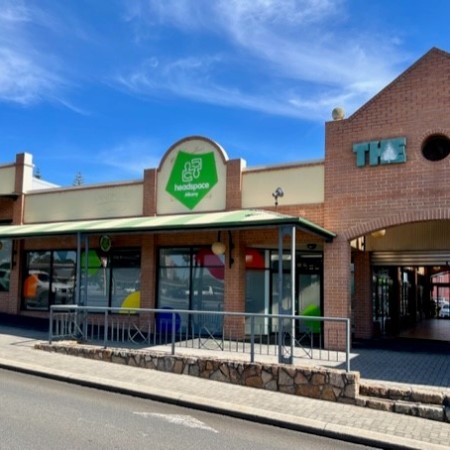headspace
Albany
-
St Emilie Way, Albany, Western Australia 6330
-
Phone (08) 9842 9871
-
Fax (08) 9842 6201
-
info@headspacealbany.com.au
-
About
Kaya! Wanjoo!
At headspace Albany we offer support for young people aged 12 - 25 years. You can come in for a once-off chat or access support that is more ongoing. Our services cover a wide range of needs, including mental health and wellbeing, physical health, sexual health, substance use, work and study options, and support for family and friends.
We provide all these services at NO COST and we don’t have waitlists. We coordinate everything from our centrally located centre in the middle of Albany, but we also provide services throughout the Great Southern. Additionally, we offer telephone and online videoconference appointments so you can access support from wherever you are.
If you have a Videoconference appointment Videoconference waiting room here
To make an appointment call 9842 9871, email info@headspacealbany.com.au or drop in and have a chat with a member of our team.
Hours
- Monday: 9:00am - 5:00pm
- Tuesday: 9:00am - 8:00pm
- Wednesday: 9:00am - 8:00pm
- Thursday: 9:00am - 5:00pm
- Friday: 9:00am - 5:00pm
- Saturday: Closed
- Sunday: Closed
headspace Albany is operated by Youth Focus. All headspace services are funded by the Australian Government Department of Health and Aged Care. Administration of funding is carried out by the headspace centre’s local Primary Health Network, in this case, Country WA (WA Primary Health Alliance Ltd).
Services
Your GP can refer you to see a specialist youth psychiatrist for bulk billed assessment and management advice for mental health issues.
If you live near our headspace centre in a rural area but cannot travel in to see us, you can see our mental health workers online.
Mental health workers – which may include psychologists, psychiatrists, counsellors and other workers – that can help if you're just not feeling yourself.
Sexual health screenings on site or links to local services.
Workers either on site or linked to the centre who can assist you with work or study opportunities.
Centres have a range of programs and activities for young people. Just ask your centre what they have on.
Get tips on how to prepare your resume and present for interviews. Find out about local employment opportunities (full time, part-time, or casual).
Nutrition screening, dietary assessment and education about food and lifestyle, also support around healthy eating strategies.
GPs can help with any physical health issues as well as issues related to sexual health, drug or alcohol use, relationship problems or feeling down or upset. Your centre may have a GP on site or links to one locally.
Workers either on site or linked to the centre who can assist you with any alcohol or other drug concern.
A group of young people who help with events and some decision making at a centre. Ask your centre about getting involved.
News
More information
Next week we’ll be launching our yearly Centre Friendliness Audit. It’s where we ask you and your family to do a two minute anonymous survey when you come in about your experience of the headspace Albany Centre - does it feel welcoming? Safe? What can we do better?
That way, we can make changes based on your feedback. We’re not just saying that, we really mean it. Since 2019, your feedback has resulted in us adding a tea and coffee station, making lighting a bit dimmer, putting plants throughout our centre (real ones, not plastic!) and being open some evenings. The photos show what feedback has made happen!
We want you to be part of the ongoing conversation of how we can make sure headspace Albany feels safe for young people and their families. We want to provide you with the best service we can, and we value your voices, so have your say in August and complete a questionnaire to help us help you.
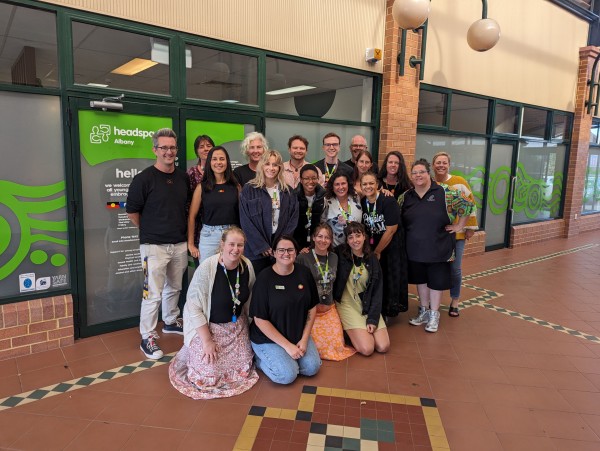
This project is aimed at supporting five headspace centres around the country to foster connections and build meaningful relationships and partnerships with local Aboriginal and Torres Strait Islander communities. On 27 and 28 February, headspace Albany closed its doors so that all staff members as well as representatives from our lead agency could take part in a workshop hosted by Sarah Thorne and Melissa Puertollano.
While some of us were slightly nervous – and some freaking out - at the start of the two-day workshop, many of us were ready to throw ourselves into the project to ensure that we could start helping our community as soon as possible in a way that is helpful to the community.
This enthusiasm must be combined with the core concept of 'working at the speed of trust'. We need to work hard to take time to have a yarn and share experiences to create long-lasting relationships with First Nations people. These ideas and language itself played a very important role over the two days. Phrases such as "working at speed of trust", "sit in the uncomfortable spaces", "dabarkarn (gently moving)" and "holding space for the quiet voices".
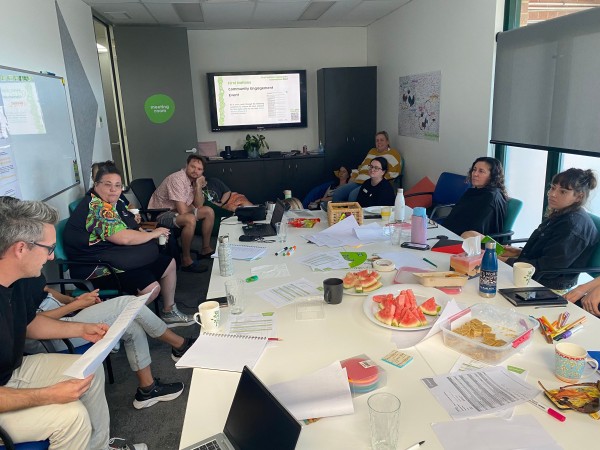 We are approaching this project as a whole team. This work is everyone's and it can't succeed relying on one or two people, or roles. Moving clinicians into community where they can be seen, where they can listen and where they can develop true relationships is the only way we will build lasting and meaningful trust. Taking a 'whole of centre' approach is about building everyone's confidence and courage together so that we can go on this journey together. That will take longer, but help us reach further and have deeper connections with deeper listening.
We are approaching this project as a whole team. This work is everyone's and it can't succeed relying on one or two people, or roles. Moving clinicians into community where they can be seen, where they can listen and where they can develop true relationships is the only way we will build lasting and meaningful trust. Taking a 'whole of centre' approach is about building everyone's confidence and courage together so that we can go on this journey together. That will take longer, but help us reach further and have deeper connections with deeper listening.
If we are able to take actions that are respectful and culturally safe, we can aim to embody the idea of being and becoming an ally to those around us; rather than us deciding what we believe First Nations people need, we need to listen to understand the people in the quiet spaces and collaborate to create a project that is led and informed by these voices.
Across the two days, our team felt comfortable asking questions and appreciated the opportunity to listen and "loved the opportunity to take turns yarning and not rushing to share stories and reflections over the two days. The practice of slowing down and deep listening was an invaluable skill to practice and learn for our engagement with First Nations peoples".
Learning more about creating relationships that are meaningful rather than transactional was part of one of the key points about connecting with the First Nations community, as was the importance of ensuring that our work involves true co-designing rather than consulting. 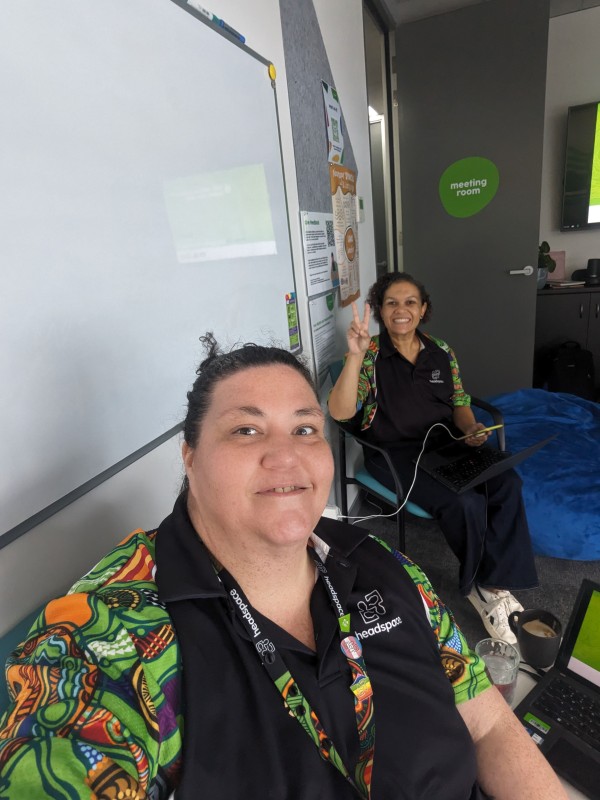
The workshop allowed us to look at the way that we work and how we can do better. Are we listening to the quiet voices in the community? Do we truly know the community? It is simple to ask for information when you need it, but we may unintentionally increase the cultural and colonial load of those around us. There are many aspects of people's lives that we don't see or may not consider.
We aren't always aware of sorry business or the cultural responsibilities to land and family that Elders and leaders in the community have – and we need to go slowly when asking for more of these people.
Throughout the workshop, we were told that we would make mistakes, and that making them was ok, as long as we learnt from them. Fears of being tokenistic and not knowing what our next steps will be part of the journey we are embarking on. But as we learnt, trusting ourselves with interactions that we have and being ok with potential change of plans, is what will help us adjust to new situations.
Finding this out will come through us going on a journey. Not
one that is necessarily led by us. But one where our role is to listen and to go where we need to go.
Although we're just at the start, the project has already made our team think deeper about how we are working and how we can further incorporate Social Emotional Wellbeing into our existing Single Session and family work. As described by one team member, this experience was "a great opportunity to connect and drive this process together as a team. Great to listen to other's perspectives and experiences other than needing to share what I already think I know".
We've worked really hard within our clinical work to be and not do, to listen and to work in a way that suits the young person rather than us. This project is going to further strengthen and develop that work and highlights that we need to explore more community connections and cultural supervision options to take that work further for all young people – not just First Nations young people.
Space to both yarn and listen played an important part in the experience. Through this, mutual learning was able to take place. Sarah and Mellissa learnt from the team as well. Sarah learned it's worthwhile "checking in first with the Elders, local Aunties and Uncles of the area that I'm travelling to before meeting everyone at the centre". 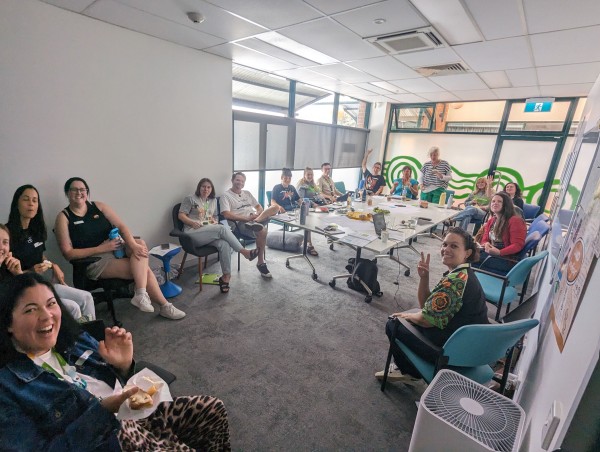
Placing ourselves as allies and not assuming that we have a seat at the table is a step towards establishing trust as we aim for self-determination during the process of co-design. This process may not happen around a table or in our centre. Having a yarn over a cup of tea, having the privilege to hear existing knowledge and being prepared to hear that what we are doing may be tokenistic or that everyone you talk to wants to be part of what we do are simply part of the process.
The next steps may not be obvious to us, we're going to have to adjust to new ways of working and learning. Not everything will go to plan, but through meaningful interactions like having a yarn and creating connections, we can be more authentic in our actions to create a successful First Nations Community Connections (FNCC) Project.
Give Feedback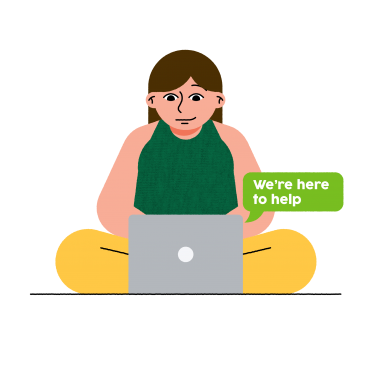
At headspace Albany, you have the right to an environment where you feel welcome, accepted and safe. If this hasn’t happened, we want to know about it, so we can do better.
You can use this QR Code and link to provide feedback, compliments or complaints. This can be about anything to do with headspace programs, services or people.
Your feedback will be sent to our Feedback team who will decide how to respond. You can remain anonymous if you wish, but your feedback will never impact on you getting help at headspace.
https://www.surveymonkey.com/r/feedbackhAL
If you have any questions -
please contact the Feedback team on
(08) 6266 4333 or at feedback@headspacealbany.com.au
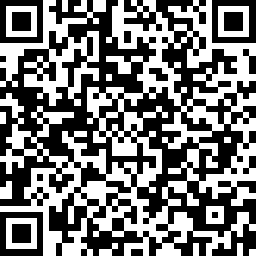
Andrew Wenzel – Manager
Emily Matthews – Clinical Lead
Emily Harper – Clinical Psychologist
Hua Tong - Access Clinician
Ruby Taras - Early Career Program Graduate / Access Clinician
Christie Huggins – Clinical Educator / Occupational Therapist (Mental Health)
Dimitie Cook – Occupational Therapist / Counsellor
Zachary Tonkin – Social Worker / Counsellor
Josh Morcombe - Social Worker / Access Clinician
Rebecca Forster - Social Worker / Access Clinician
Monique Gray – Senior Vocational Specialist
Connie Ruffo – Vocational Specialist
Jasmine Heslop – Senior Administrator / Community Engagement Officer
Jamie Murphy – Receptionist/Administration Officer / Community Engagement Officer
Janaya Ruffo – Receptionist/Administration Officer
Renae Tomic – Psychologist (Sessional)
Getting to headspace Albany
We are located on St Emilie Way which is at the top of York Street, the surrounding shops can sometimes help guide people here. Opposite ABC Great Southern radio studio and a few shops down to Hollywood Nails. If in doubt Google Maps will show you the way.
The front door opens into the arcade, not off the main street. The whole centre is accessible for wheelchairs and people with access needs. If you have any queries about accessibility please ask when you call us or ask your care coordinator so we can help you out. The door is not automatic and can be heavy to open, please knock if you need assistance or call ahead.
Access information:
The entry to headspace Albany is a tiled and covered passage way. On the St Emilie Way side there is a brick paved pathway, that is on an incline. On the car park side there is a asphalt coated car park with some loose gravel. This is the side where the ACROD parking is located.
Inside the centre there are carpet squares through out and lino in the bathroom. The bathroom is for use by all genders and the hand rail is on the right hand side.
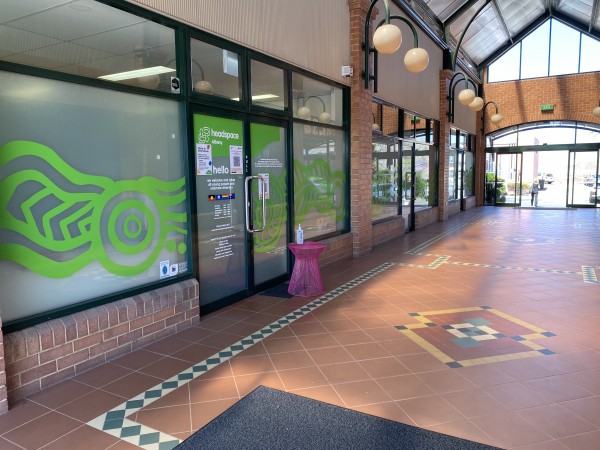
We have ample 2-hour parking at the back of the centre in a car park shared with the surrounding shops Icky Finks, Hollywood Nails and Sportspower.
Bus timetables can be found Routes 803, 804 and 805 Routes 806,807 and 808
Have your say in how headspace Albany works - join the headspace Advisory Committee
headspace Albany is recruiting new members for our 2024 Youth Reference Group – the headspace Advisory Committee (hAC)
We are looking for young people aged 15-25 who have ideas and opinions about youth issues and mental health in the Great Southern community, and want to:
- Help headspace Albany decide how best to support young people, co-designing our mental health programs,
- Connect and work with other young people passionate about youth mental health and wellbeing,
- Help organise and be part of headspace Albany events like the Mad Hatters Tea Party,
- Work with headspace Albany, other young people and other services to make the Albany community better,
- Get involved in media opportunities to promote youth mental health and wellbeing,
- Help make sure what headspace Albany does is youth centred and inclusive.
If this sounds like something you’re interested in, talk to one of the headspace Albany team about joining hAC.
You can gain experience and new skills with support, media and public speaking, training and opportunities to add to your CV. And we hope it will be fun as well.
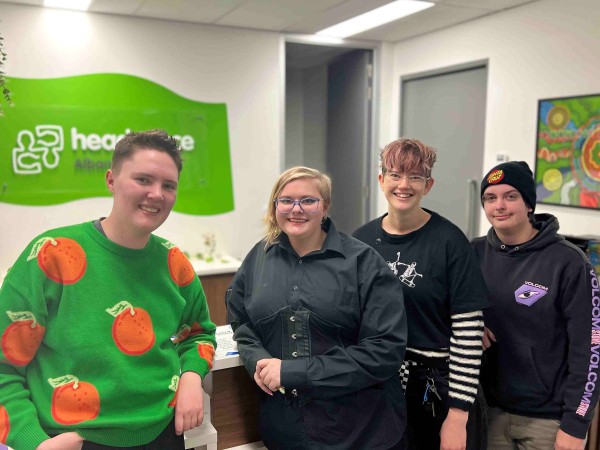
Some of our 2023 hAC members
What does hAC actually do?
Some of the ways hAC has made a difference include:
- Helping us design our headspace Centre,
- Being on interview panels for all headspace Albany staff
- being interviewed by media about youth mental health issues
- be a part of promoting headspace Albany and mental health supports to other young people through stalls and events.
- Being a part of presentations about mental health and wellbeing in schools
What's the Commitment?
Membership of hAC runs for a year – and you have the option of renewing at the end of the year.
We ask that you be available a 2 hour meeting every month, held in the evening so it doesn't interfere with school. We’ll pay you and supply the pizza!
There are some extra occasional commitments on top of this;
- Occasional special events
- Checking and participating in the group chat
- Contributing your thoughts in meetings
If you are interested, we'd love to meet with you! If you're not sure, you can come along to a meeting and see if you think hAC is for you.
If you are keen to join hAC or to find out more about what hAC does contact Thandi on 9842 9871 or email: info@headspacealbany.com.au

